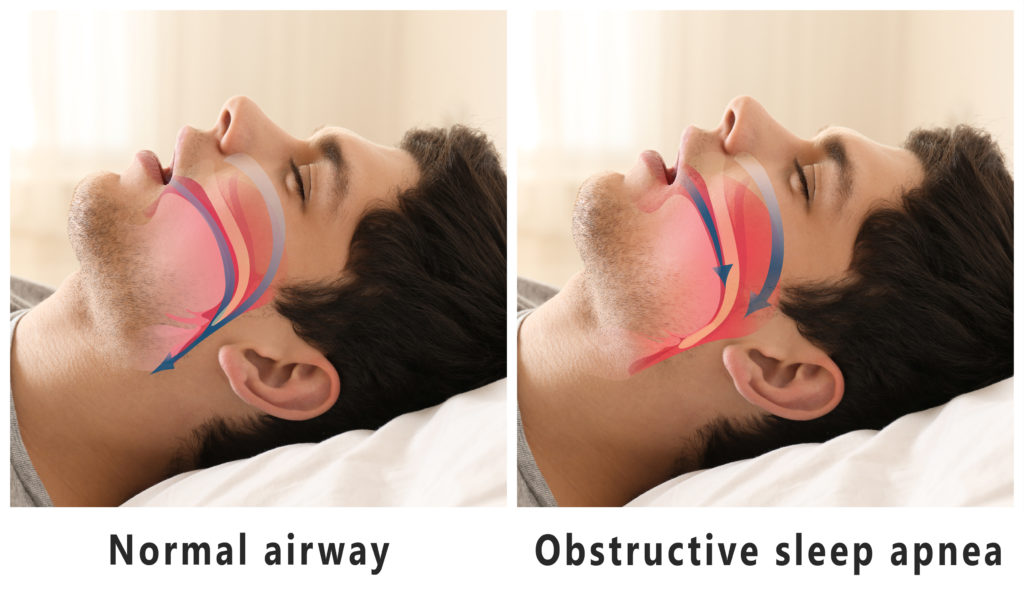About Sleep Apnea Treatment
Sleep apnea can reveal its presence in a number of ways, and each patient may have a unique combination of symptoms. If you experience any of the following recurring sleep apnea symptoms, please feel free to contact us. Dr. Brien Hsu is the only dentist in Rancho Cucamonga to attain the original Diplomate status through the written examination and submission of numerous sleep medicine clinical case studies, approved by the American Board of Dental Sleep Medicine. In addition he is the first dentist from the USC School of Dentistry to publish an article in the prestigious Journal of Clinical Sleep Medicine. Many of his patients who cannot tolerate CPAP therapy have benefited from his specially designed oral appliances, which helps maintain airway patency.
Sleep Apnea Symptoms:
- Excessive daytime sleepiness
- Morning headaches/migraines (may also signify a jaw joint problem known as TMJ/TMD). Our dentists are also experienced in neuromuscular dentistry.)
- Short term memory problems
- Weight gain
- Tiredness
- Gastric reflux
- Dry mouth
- Sore throat
- Slow metabolism
- Inability to lose weight
- High blood pressure
- Diabetes
- Depression
- Severe Anxiety
- Memory and concentration difficulties
- ADD and ADHD symptoms
- Intellectual deterioration
- Mood swings/temperamental behavior
- Poor job performance or problems in school
- Mouth breathing
- Restlessness and tossing and turning during sleep
- Impotence
- Decreased sex drive
- Difficult nose breathing
- Choking/gasping sensation that wakes you up
- Insomnia
- Inability to sleep through the night
- Heavy snoring (more common in patients with obstructive sleep apnea, rather than central sleep apnea)

Depending on each patient’s diagnosis, treatment for sleep apnea may be as simple as a lifestyle change such as weight loss or change in diet. Other patients may benefit from the help of a specially designed oral appliance, which prevents airway blockage. More severe cases of sleep apnea may require surgery to prevent upper airway obstruction. First and foremost, Dr. Hsu will examine your living habits and make recommendations for behavioral therapy, such as avoidance of alcohol or sedatives, or sleeping in a new position. Use of pillows to alter your nighttime breathing habits may be suggested.
With his extensive experience in sleep apnea treatment, Dr. Hsu can use a variety of oral appliances that are custom-fitted to help the patient sleep soundly and minimize the effects of sleep apnea and snoring. These FDA-approved devices essentially treat Obstructive Sleep Apnea by preventing airway obstruction and allowing the patient to breathe easily and continuously. Worn in the mouth like a removable orthodontic appliance during sleep, oral appliances keep the soft tissue from collapsing and interrupting normal breathing patterns. The purpose of the oral appliance may be to reposition the lower jaw, tongue, soft palate, and hyoid bone into a certain position, to keep the airway open with stabilization of the tongue and jaw, or to provide artificial muscle tone to prevent collapse and resulting airway blockage. Dr. Hsu will fit your oral appliance for comfort by using a mold of your mouth to design your unique fit. This device has a very high success rate and is much often preferred by patients over the CPAP. Continuous positive airway or CPAP is a form of mechanical therapy that utilizes a mask with an air blower to force air through the patient’s upper airway, assuring constant inhalation of adequate amounts of oxygen.
After a complete diagnosis, Dr. Hsu will recommend an oral appliance if needed, and let you know which design type will work best for you. Oral appliances may be used in conjunction with other sleep apnea treatments.
